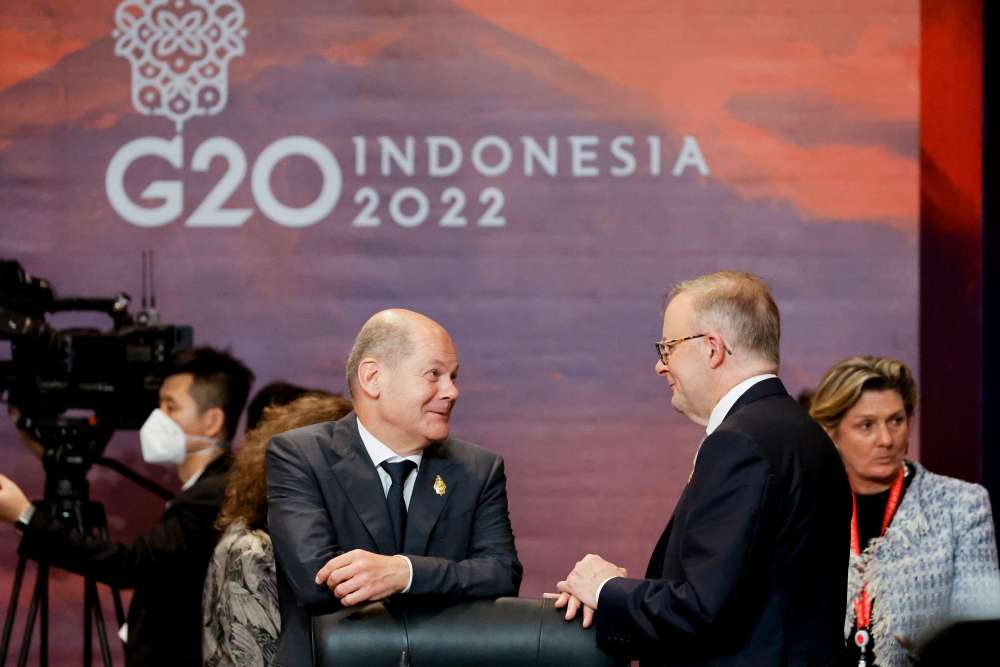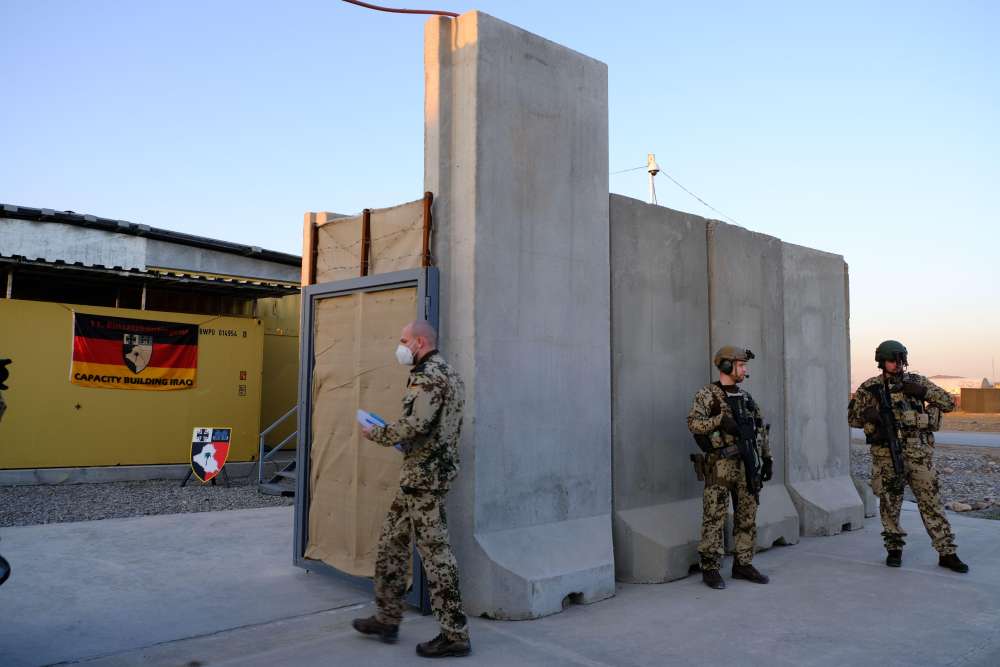Embrace Multipolarity: Germany Must Act European for the Global Common Good

(WILLY KURNIAWAN/POOL/EPA-EFE/Shutterstock)
To promote a more peaceful world, Germany needs to move past primarily national strategies and start thinking European. The best way to do that: support a strong global role for the European Union.
Germany can and should only shape its international policy as a part of and contribution to the global positioning of the European Union. As Chancellor Olaf Scholz recently framed it: “The central question is this: How can we, as Europeans and as the European Union, remain independent actors in an increasingly multipolar world?” He explicitly linked this question not only to Germany’s roles as a “guarantor of European security” and “a bridge builder within the European Union,” but also as “an advocate for multilateral solutions to global problems.” If this, as Scholz put it, “is the only way for Germany to successfully navigate the geopolitical rifts of our time,” then the forthcoming German National Security Strategy, as well as Germany’s international policy more broadly, must work out how this role can be translated into operational political practice. Germany does not need primarily national strategies, but rather strategies that think and act European and support the emergence of a strong global presence for the European Union (EU).
Closing the Strategic Void
As the EU repositions itself in a multipolar world, it should strengthen its strategic autonomy by forging cooperative alliances with a diverse range of partners and aligning its external policies with the global common good documented in the 2030 Agenda and its 17 Sustainable Development Goals (SDGs). Already, the 2016 Global Strategy for the EU’s Foreign and Security Policy spoke about “times of existential crisis” and set out to navigate a “difficult, more connected, contested, and complex world.” The 2016 strategy nurtured “the ambition of strategic autonomy,” called for strengthening the Union on security and defense but also affirmed that the EU “cannot pull up a drawbridge to ward off external threats.” It committed that the EU would “invest in win-win solutions and move beyond the illusion that international politics can be a zero-sum game.” Consequently, the strategy pledged that “our security at home depends on peace beyond our borders” as well as that “prosperity must be shared and requires fulfilling the Sustainable Development Goals worldwide, including in Europe.”
In 2023, for most in Europe, the world looks quite different from the world of 2016. Russia’s war of aggression against Ukraine was taken as a “watershed moment in global politics” (European Commission President von der Leyen) or as a “Global Zeitenwende” (Chancellor Scholz). However, this moment and its political ramifications should also be seen as part of a broader, long-term global sea change that was already underway when the 2016 Global Strategy was conceptualized and to which it provided some basic answers that are still valid today. Unfortunately, the Global Strategy – although still formally in place – is currently seldom referred to and its implementation is no longer reported on by the EU. Its absence leaves a strategic void that Germany should advocate to close soon.
» Peace cannot be assured solely through ‘defense-against’ thinking. It also requires a ‘cooperation-for’ approach. «
The EU’s new Strategic Compass for Security and Defense from 24 March 2022 falls short of representing a comprehensive answer to today’s global challenges. Prepared in the years before, but finalized only a month after, the start of Russia’s war of aggression in Ukraine, the 2022 Strategic Compass frames global trends as threats to the Union and formulates answers solely in the field of security and defense. The EU’s Compass lacks – in contrast to the new US National Security Strategy – any reference to the universal sustainable development agenda and does not provide an adequate partnership concept even in its own narrow field. Though concern for more EU unity and autonomy, also in the field of security and defense, is very much warranted, such a limited and short-sighted approach leaves a strategic void, runs the risk of backfiring and – most importantly – harms the global common good. Precisely because the proclaimed “comprehensive concept of security” is all but comprehensive, its threat-oriented approach tends to dominate the discourse of the EU’s entire external policies, from diplomacy to trade and international partnerships. Yet, in a multipolar world, peace cannot be assured solely through ‘defense-against’ thinking or the “dangerous logic of zero-sum competition.” It also requires a ‘cooperation-for’ approach: for a sustainable, peaceful future.
To avoid the trap of aligning all of the EU’s external policies with the 2022 Strategic Compass’ threat-oriented approach, Germany should work with EU members to review, reinvigorate and strengthen the EU’s 2016 Global Strategy swiftly and comprehensively. Such an update should capitalize on key policy documents issued by the EU over the past seven years, including the February 2021 plan “On Strengthening the EU’s Contribution to Rules-Based Multilateralism” or the June 2022 approach on “The Power of Trade Partnerships: Together for Green and Just Economic Growth”. In both documents, the SDGs rightfully take center stage. Already in 2017, the New European Consensus on Development laid the basis for orienting the EU’s international partnerships toward achieving the SDGs. To underpin its engagement for a strong and up-to-date EU Global Strategy, the German government should broaden and deepen the domestic public debate on the EU’s role in a multipolar world and Germany’s contribution to it – including a clear European focus for its upcoming national security strategy.
Multipolarity as Opportunity
Even though many in Germany and Europe, like in the EU Strategic Compass, take the advent of an ever-more multipolar world as a given, multipolarity is mostly perceived as a threat and a challenge to multilateralism. Such an approach not only fails to recognize the ambition of many (re-)emerging societies and states to fully develop their potential and rightfully play a bigger role in the international order, but also ignores how multi-faceted and multi-layered the multipolar world has become. Instead, Germany should support a European positioning that values multipolarity as an opportunity not only for the world, but also for the EU itself. A multipolar world becomes more stable, peaceful and prosperous when it is supported by numerous cooperation networks involving different actors on a diverse range of issues and when these actors align themselves with the global common good. Thus, Germany and the EU should resist the all-too-simple dichotomy of ‘democracy vs. autocracy’ as well as the temptation to organize its partnerships in concentric circles around the G7 and NATO spheres. This would only serve to deepen geopolitical divides, hamper the EU’s strategic autonomy and endanger possible solutions to global problems. Instead, the EU needs to navigate and shape today’s global landscape in a way that is conducive to achieving the SDGs. The struggle toward the global common good calls for coalitions that work across geopolitical fault lines.
» The struggle toward the global common good calls for coalitions that work across geopolitical fault lines. «
Until today, the EU’s Common Foreign and Security Policy lacks clarity on how to universally realize the 2030 Agenda. However, especially in a world characterized by increasing tensions, a systematic SDG diplomacy can help build bridges, strengthen multilateralism and promote the EU’s geopolitical position. Since it is insufficient to refer to the SDGs solely for guidance when cooperating with poorer countries, Germany should encourage and support the EU to also leverage its relations and its economic and political weight with countries like the United States, China and Australia to drive SDG implementation forward – within these countries, between them and the EU, and in their external actions with other states. The statement from the 2021 EU-US Summit ‘Towards a Renewed Transatlantic Partnership’, with its explicit reference to the 2030 Agenda, is one small step in this direction.
Alliances for the Global Common Good
Attempting to forge alliances for the global common good primarily from within the G7 is futile. Germany should not stand in the way, but rather drive initiatives by the EU and its member states to jointly strengthen, reform and work through more diverse and universal forums, such as the G20 and the United Nations. This is the best way to advance the international order so that other regions and countries have more say in shaping our common future. The recent G20 Summit in Indonesia, the climate COP27 in Egypt, and the biodiversity COP15 under a Chinese presidency in Canada have demonstrated that working with diverse sets of partners can contribute to global understanding and commitments on action toward a sustainable future. However, the EU still falls short of its potential to use its capacity – particularly in the G20 und UN processes – to steer and influence other states. In the run-up to COP27, the EU did not come forward with significant international initiatives regarding key issues around climate finance, loss and damage, and adaptation. It only rose to the occasion when the COP27 negotiations in Egypt were on the verge of collapse. In the G20, the EU failed to lead early on in proposing and pushing through full G20 membership for the African Union, and is now facing corresponding proposals from China and the US.
Key Points:
- Germany should push for an up-to-date EU Global Strategy, which means broadening its public debate on the EU’s role in the world and adopting a clear European focus for its upcoming national security strategy.
- Germany should support a European positioning that values multipolarity as an opportunity not only for the world, but also for the EU itself.
- At the international level, Germany should join forces with France, Italy and the EU to form a dedicated ‘Team Europe’ in the G20 that works toward the global common good.
- Alongside more proactive policies in the UN and G20, Germany and the EU should investing much more in its wide-ranging partnerships with other regional bodies like the African Union, ASEAN and Mercosur.
To strengthen the EU’s role for the global common good in a multipolar world, Germany should join hands with France, Italy and the EU to form a dedicated ‘Team Europe’ in the G20 that coordinates initiatives, promotes continuity and works closely with consecutive G20 presidencies. The current G20 presidency of India (2023) and the upcoming presidencies of Brazil (2024) and South Africa (2025) offer unique opportunities for collaboration. These should not be missed on the road to getting the 2030 Agenda back on track and ensuring that both the United Nations 2023 SDG Summit and its 2024 Summit of the Future effectively advance SDG implementation and reinvigorate multilateralism. Such a ‘Team-Europe’ approach within the G20 could become all the more important as Namibia and Germany’s Permanent Representatives to the United Nations take on the role of co-facilitators for the preparatory process of the Summit of the Future. In the G7, Germany should coordinate closely with France, Italy and the EU to make sure that G7 members support both the ambition and the success of the G20 processes.
Alongside more proactive policies in the UN and G20, the EU could significantly contribute to a stable, peaceful and prosperous multipolar world by deepening and investing much more in its wide-ranging partnerships with other regional bodies like the African Union, ASEAN and Mercosur. The EU should also significantly expand and strengthen issue-specific alliances with countries and societies on all continents, including those with whom it does not agree on some topics. The European Green Deal and the broader domestic implementation of the SDGs provide great opportunities to build cooperation with other states and regions of all income levels in reciprocally transformative partnerships, such as restructuring value and supply chains to support sustainable production and consumption.
Whatever It Takes
The global common good of a secure, peaceful world is not cheap. If Germany wants the EU to be seen as a globally reliable partner and relevant actor for sustainable development and peace, Germany needs to invest in the EU’s international partnerships and credibility. This includes addressing double-standards, historic responsibilities, broken promises, and ensuring greater policy coherence between its internal and external policies.
» Now is the time for the EU to move beyond inward-looking and Europe-focused answers and invest whatever it takes in the global common good. «
Over the last decade, the EU has taken a ‘whatever-it-takes’ approach in its reactions to many crises, from the impacts of the global financial crisis on Europe to the socio-economic consequences of the COVID-19 pandemic, and the current domestic repercussions of Russia’s invasion of Ukraine. In situations like these, other issues like the climate crisis and the concerns of others (like those of poorer as well as emerging economies) are in danger of being heavily overshadowed – to the detriment of global solidarity in times of conflict. Admittedly, Team Europe (EU institutions and EU member states) has delivered around €50 billion to help partners address the COVID-19 pandemic and its consequences, and pledged to mobilize up to €300 billion between 2021 and 2027 for Global Gateway, the EU’s new global infrastructure strategy. However, little is known as to whether these investments stem from additional funds or whether they come from public or private sources. What is clear is that these figures pale in comparison to the stimulus packages that the EU and its member states have mobilized domestically. Thus, now is the time for the EU to rise to the occasion, move beyond the inward-looking and Europe-focused answers, and invest ‘whatever it takes’ – diplomatically, financially and by means of cooperation and coherence – in the global common good.
The United Nations’ Secretary General is calling for the launch of an SDG Stimulus – led by the G20 – to massively boost sustainable development for developing countries. Germany should invite France, Italy and the EU to jointly support this initiative within the G20 and mobilize the additional financial resources. In doing so, cooperation for the global common good could be established as the hallmark of the EU’s strategic autonomy in a multipolar world.
The article is based on the author’s paper “Whatever it takes: Establish the global common good as Europe’s strategic compass in a multipolar world” in the Europe Sustainable Development Report 2022.
Adolf Kloke-Lesch
Ko-Vorsitzender, SDSN Europe & Assoziierter Wissenschaftler, German Institute of Development and Sustainability (IDOS, ehemals Deutsches Institut für Entwicklungspolitik)
Anna-Katharina Hornidge
Direktorin, German Institute of Development and Sustainability (IDOS, ehemals Deutsches Institut für Entwicklungspolitik) & Professorin für globale nachhaltige Entwicklung, Universität Bonn
Weiterlesen

Germany’s National Security Strategy: A Chance to Pivot to Adaptive Cyber Resilience
Most cyber incidents can be avoided. Germany’s efforts for a more resilient cyber security strategy critically depend on its ability to learn, adapt and coordinate important stakeholders.

Germany’s Role as a Global Leader in Stabilization
Stabilization can be one of the most effective ways to help countries prevent or emerge from violent conflict. Germany already leads the way – and should expand on this role with its new security strategy.

Germany Needs a National Directive on Autonomy in Weapon Systems
The international effort to regulate autonomy in weapon systems via the United Nations in Geneva is stuck. It is time for Germany to develop and implement its own national directive – and foster regulatory processes in new fora.